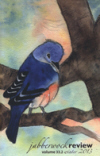Jabberwock Review – Winter 2013
We all know the jabberwock, Lewis Carroll’s monster with its eyes of flame, riffling through the tulgey woods and burbling as it came. The story of the jabberwock “fill[s] [Alice’s] head with ideas—only I don’t exactly know what they are.” We might say that read-worthy literature is all like that, filling our heads with images and sounds whose meanings reach far beyond their mundane expression. I imagine that’s where the title of this journal, created by students and faculty of the Department of English at Mississippi State University, wants to point us: beyond our daily routines, into relevant, effective words that revise our ordinariness.
We all know the jabberwock, Lewis Carroll’s monster with its eyes of flame, riffling through the tulgey woods and burbling as it came. The story of the jabberwock “fill[s] [Alice’s] head with ideas—only I don’t exactly know what they are.” We might say that read-worthy literature is all like that, filling our heads with images and sounds whose meanings reach far beyond their mundane expression. I imagine that’s where the title of this journal, created by students and faculty of the Department of English at Mississippi State University, wants to point us: beyond our daily routines, into relevant, effective words that revise our ordinariness.
And so it does. This is a small, manageable journal (90 pages, nice-sized font) of good poems, fiction, and essays by people from all over the country. The language of “Looper,” by Steve Trumpeter of Chicago, is fast-paced, perfectly-pitched. The caddy narrator, Ringer, whisks us through the frustrations of the job, the sport, the lifestyle; I like him from the first sentence (“On eighteen, I know exactly what will happen as soon as Ethan asks me for his seven iron.”) to the last (which I will not disclose, lest I spoil the considerable pleasure of the story).
Garrett W. McDonough’s “Active Adult,” referencing our compulsive need to Google ourselves and our connections, gives us a main character we may not relate to but can’t help being interested in: she’s erased herself from the Internet, but her grandmother has both her same name and a surprisingly shady past. Much merriment ensues. It’s almost a Shakespeare play for the twenty-first century.
The third story in this volume, “The Specioso,” by The Missouri Review’s associate editor Evelyn Somers, is perhaps the most sobering, a concise tale about disappointment and a kind of revenge, the protagonist revisiting an icon of the difficult past to press away the bruises of today. All three of these stories are strongly written and sharply imagined.
Two fine personal essays about obsessions (well, sort of) round out the prose contributions. Deborah Thompson’s “The Buddha’s Hunger” recounts how self-starvation shuts out other pain, delineating a journey from anorexia through grief and acceptance. In “83 Problems, A-Z,” Patricia Smith weaves the Dalai Lama, psychotherapy, laughter, and rage into a clever and sometimes-wise braid of motifs and anecdotes. The D.L. says every person has 83 problems, exactly. If we solve one, another pops right up. Smith enumerates not just 83, but a whole alphabet of problems we might solve, or not. It’s funny, troubling, and well worth reading.
There’s no set theme to this issue, but all the contributions seem to be story-driven, and all are satisfyingly thought-provoking without being obscure or difficult. My favorite poems are two by Sally Rosen Kindred, take-offs from “Hansel and Gretel” (“Gingerbread House: The Apron’s Lot”) and Peter Pan (“What Tinker Bell Tells the Last Boy”). Her chapbook of poems about the girls of Neverland is soon to be published; it is good to see here what else she knows about that country:
but fairies’ hearts are black math: when you’re not
looking we fly past the decimal point
into sun’s thousandths . . .
. . . . . . . . . . . . . . . . . . . . . . . .
We’re dwindling imaginary numbers
counting on your fruit-gloss skin.
In my heart now, light’s division, pinwheel wings spinning down
Similarly, “The Apron’s Lot” pulls Grimm into the wilds of post-postmodernism. These are good poetry.
As are Donna Pucciani’s “Varda, Train Station” and “Honoring the Dark.” The first memorializes a dying town: “No station left, but a long-winded whistle, / the screech of brakes on steel. Together they call, / ‘We are the way out. Come.’” The second tells the poignant story of elderly partners, one with a new hip trying to get comfortable at night, the other (the speaker) full of compassion and willing to bear the burden for love.
Good (funny, unexpected) stories drive most of the poems, as they do the prose. Gregory Sherl’s “Rocket Science” is accompanied with hand-drawn circle graphs. “I am full of space shuttles,” it begins. Then, a circle with the phrase “Space Shuttles” and the figure “100%” appears below it. The writing continues, “But sometimes I am pizza slices, / coffee grounds & damp thighs . . .” (then a circle divided into fragments, 52% coffee grounds, 21% pizza slices). I’m delighted to know what rocket science is.
Jabberwock Review is a solid, excellent journal. Follow it, snicker-snack—this issue is a very good read.
[www.msstate.edu/org/jabberwock]





